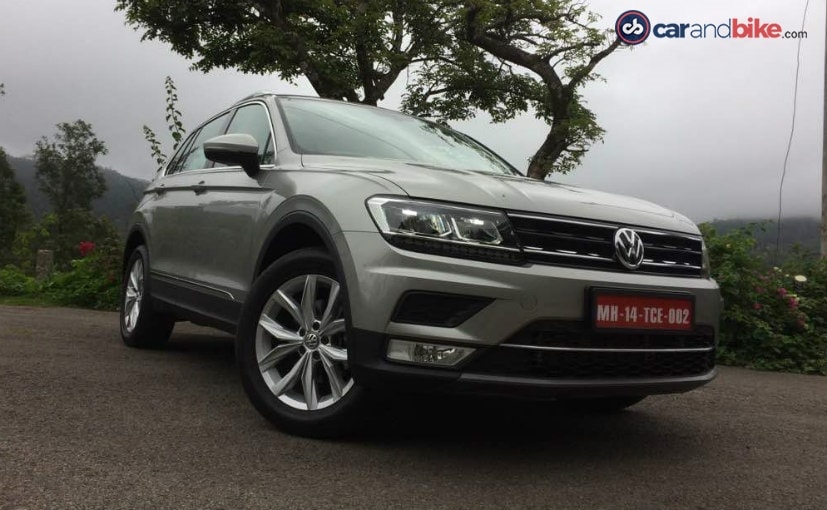
The Volkswagen Tiguan is like Jackie Chan. At first glance, it’s not intimidating; so not aggressive. Rather, it has a smile on its face and walks about, doing its things. It doesn’t even have a brawny look; so though there is a bit of muscle, it’s doesn’t really show. But, when you call it out for a fight, it doesn’t hesitate; and, yes, it gives its best shot. It’s versatile, to say the least, and Volkswagen India has made every bit of an effort to make sure that it stays that way. Volkswagen recently launched the Tiguan, in India, and at a price point that makes it lock horns with the likes of the Mercedes-Benz GLA and even the BMW X1. You cannot discount the Hyundai Tucson either; but the folks at Volkswagen insist that the Tucson isn’t its main rival; and that’s when you get to understand how desperately the company wants this one to be a midsize SUV.

The Volkswagen Tiguan gets a fair share of firsts. It marks VW India’s entry into the compact luxury SUV segment. It’s the company’s first car, in India, which is based on the MQB platform and it’s also the first car, in the compact luxury SUV segment, to get an all-wheel drive, as part of standard fitment. All that said, it’s not the first SUV, from VW, to come to India; does Touareg ring a bell? And, it’s also not made, in India, it’s assembled here. Having cleared out all the facts, let’s get on to the details.
I’ve already talked about how the Volkswagen Tiguan doesn’t really look aggressive. It borrows its face from the new-gen Passat and Golf and there’s enough chrome, on the grill and around the car, to make it look a bit more premium. The bonnet sports characteristic lines, which join the grille, in a V shape. The sleek looking LED headlights complete the sophisticated look of the car. Strap a tie on that car; and, it’s ready for a board meeting.
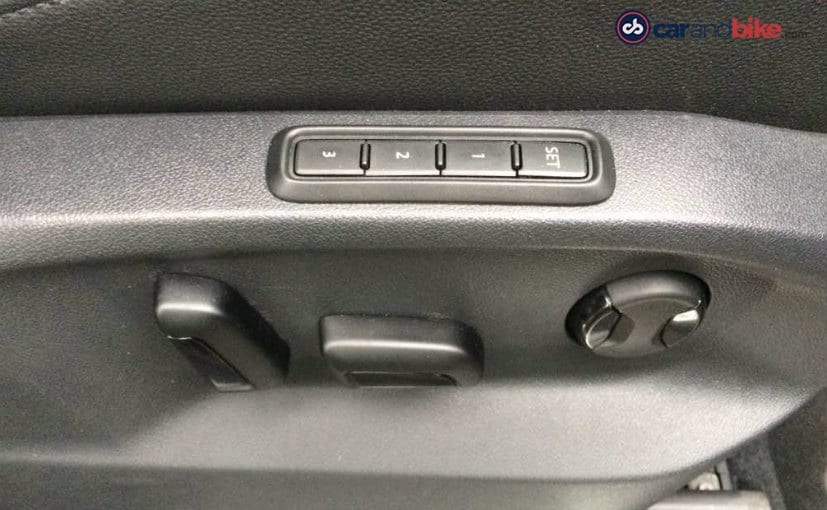 (The driver seat in the Tiguan gets electrical adjustment along with memory function)
(The driver seat in the Tiguan gets electrical adjustment along with memory function)Well, it looks better than before and we’re glad that we get the second generation of the car, in India, which looks rather attractive. Compared to the previous-gen model, the new-gen VW Tiguan is 60mm longer, 30mm wider and the wheelbase too is up by 77mm; so yes, it has grown. Though bigger, the Tiguan manages to retain its compact dimensions, with the large wheel arches with short overhangs. The Highline variant, that we were driving, comes fitted with 18-inch multi-spoke alloys, which look good (the Comfortline gets 17-inch wheels). Adding to the rugged look are the brushed aluminium-finished roof rails and the matte cladding, on the lower half of the body. The lines, on the side, merge well into the rear and that’s where you see the LED tail lamps, which are simple and only available in the Highline trim. (Yes, the Comfortline does not get LED tail lamps and we think that’s a big miss).
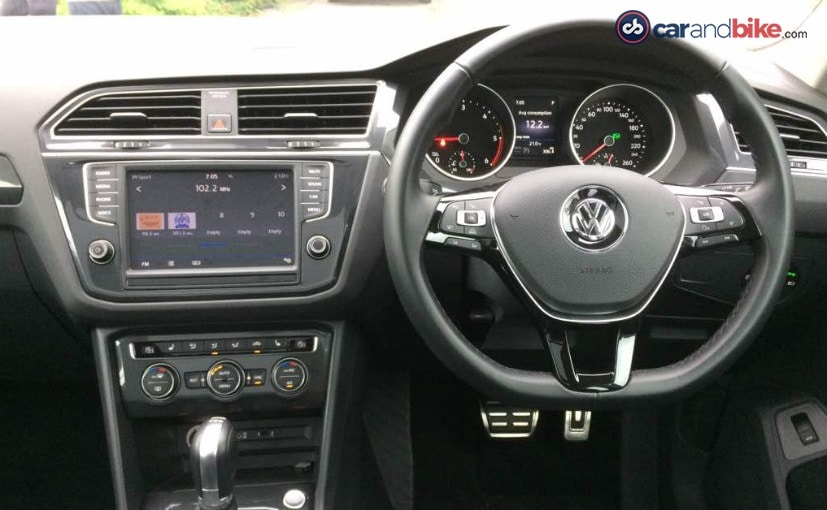 (The cabin of the Volkswagen Tiguan is nicely appointed)
(The cabin of the Volkswagen Tiguan is nicely appointed)What VW has got spot on though is the cabin; and while the seating position inside is commanding, the layout of the cabin is that of a sedan. The flat-bottomed steering wheel adds to the sportiness quotient and then there’s the twin-pod instrument cluster and finally the all-black interior, which is something that we’ve seen, on other Volkswagen cars.
 (The 12.3-inch touchscreen infotainment system gets smartphone connectivity)
(The 12.3-inch touchscreen infotainment system gets smartphone connectivity)Then, there’s the 12.3-inch touchscreen infotainment system, which comes equipped with Android Auto, Apple CarPlay and MirrorLink. It gets a Bluetooth, cruise control, an SD card slot and a CD player; but sadly, no navigation system and that would have probably been a value addition. However, the navigation can be accessed via the VW App Connect. There’s also a 3-zone climate control, on the Volkswagen Tiguan; but the panoramic sunroof is the highlight of the cabin; but, then again, that’s only available in the Highline variant. The Comfortline also misses out on keyless entry and a push button start system. The spacious cabin has room enough for 5 people and the rear seats can be adjusted, for reach and recline. The driver’s seat is electrically adjustable and has a memory function, while the navigator seat can be manually adjusted, for height and reach. There’s good enough kneeroom, shoulder room and head room and the seat cushions help in making you comfortable; even during long journeys. Ergonomically too, everything is within your reach and there are a whole bunch of cubby holes that are spread, all across the car. The Tiguan’s boot has a 615-litre capacity, which expands to 1,655 litres, with the rear seat folded down.
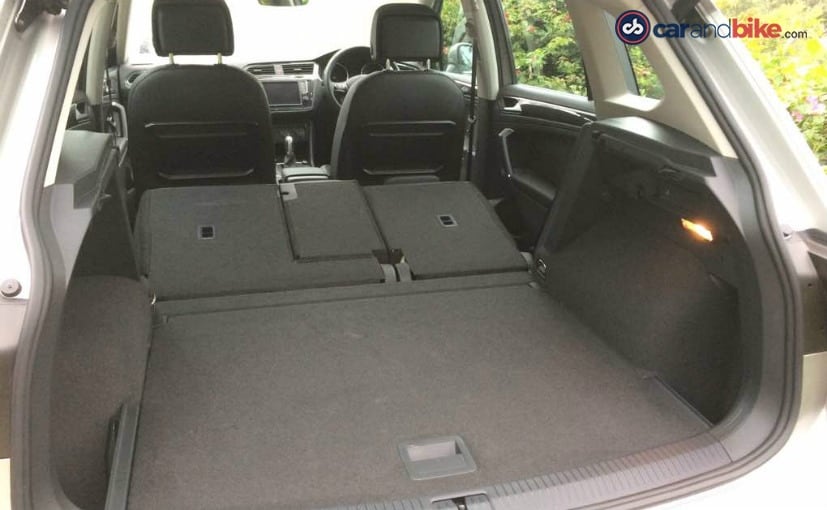
But, enough about space! Let’s talk about the engine and well, there’s just one – a diesel. While, in global markets, the Tiguan is available, with a range of powertrains, India just gets the 2.0-litre diesel option. It’s a refined unit, I must admit; but, as the revs build up, there’s a bit of engine noise that seeps into the cabin; nevertheless, it’s not too harsh. Developing 141 bhp, the Tiguan has enough power and certainly you don’t need more than that. Pulling power is available, from 1,900 rpm, and while driving, in city conditions, you do notice that there’s a bit of lag, till it hits the sweet spot. On highways though, the VW Tiguan feels more at home, as the 7-speed DSG unit channels all that power to the wheels; and you reach the three digit mark, on the speedo, effortlessly. Use the rotary control and you can select between different drive modes – Normal, Off-road, Off-road Individual and Snow. In the individual mode, you can change the preference of the steering feel, powertrain behaviour (all of which get modes – Normal Sport or Eco) and even the air conditioning. In the Off-road Individual mode, you can also alter the drivetrain and hill hold/descent settings, as well; so, there are a bunch of options, to choose from.
 (The Tiguan gets a 2.0-litre TDI engine making 141 bhp)
(The Tiguan gets a 2.0-litre TDI engine making 141 bhp)You cannot change the suspension setting on this one and that’s probably good, because this one has a bit more travel. It’s on the softer side and that’s why, it soaks in all the potholes, on the road and even the odd bumps that come your way. The cabin is well insulated, from the ‘thuds’ that you might encounter, thanks to these disturbances, on the road surface; and, we have to commend VW on the NVH levels of the car. The Tiguan builds up speed, on the highway, and there’s very little body roll that you encounter; and that is maybe because it sits lower. The ground clearance is a mere 149 mm, which, for an SUV, is less. The brakes have a nice bite to them and there’s no drama; if you want to stop, in a hurry. It’s not a hard core off roader though; so while it has AWD, it can’t be considered as one. It will do well on rough surface; but don’t expect it to do what a Fortuner or an Endeavour is capable of.
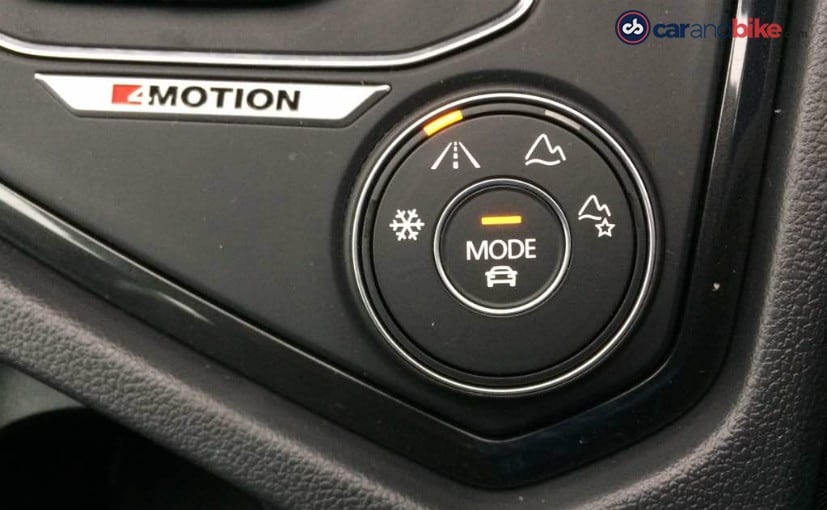 (The Tiguan gets an AWD as well)
(The Tiguan gets an AWD as well)As far as safety is concerned, the Volkswagen Tiguan 2017 model has already received a 5 star rating, from Euro NCAP; and yes, the Indian edition too comes packed, with a whole bunch of safety features. It has six airbags, as standard, Isofix child-seat mounts, seat-belts with pre-tensioners, parking sensors, ABS, stability control and a tyre pressure monitoring system. The Highline variant, of the Tiguan also gets reverse parking camera and even self-sealing tyres (basically tyres which won’t puncture, unless you really try hard to get them to). As part of pedestrian safety, the VW Tiguan also gets a sensor, on the front bumper that raises the rear end of the hood, to minimise the injuries caused to a pedestrian, something which comes in handy.
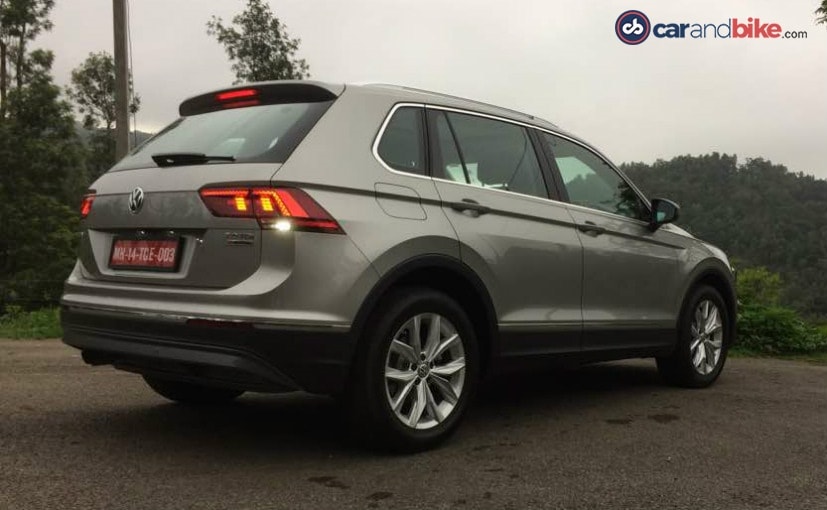 (The Tiguan has an claimed efficiency of 17 kmpl)
(The Tiguan has an claimed efficiency of 17 kmpl)This feature packed car is priced at ₹ 27.98 lakh, for the Comfortline, and more than ₹ 31 lakh, for the Highline, making it more expensive than the Hyundai Tucson and even the Ford Endeavour; thus pushing it into a niche segment, with contenders like the Mercedes-Benz GLA and the BMW X1.
The Tiguan, then, proves to be a feature packed, practical offering, which returns a fuel economy figure of more than 17 kmpl (ARAI tested) and still has the finesse of a luxury car. Assembled in India, the Tiguan might take some time to show a spike, on VW’s sales chart; what it will do, however, is set a precedent for other manufacturers, to not shy away from entering a niche segment.
[“Source-smallbiztrends”]




